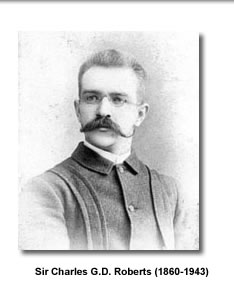TRANTAMAR REVISITED
Sir Charles G.D. Roberts
Summers and summers have come, and gone with the flight of the swallow;
Sunshine and thunder have been, storm, and winter, and frost;
Many and many a sorrow has all but died from remembrance,
Many a dream of joy fall'n in the shadow of pain.
Hands of chance and change have marred, or molded, or broken,
Busy with spirit or flesh, all I most have adored;
Even the bosom of Earth is strewn with heavier shadows, --
Only in these green hills, aslant to the sea, no change!
Here where the road that has climbed from the inland valleys and woodlands,
Dips from the hill-tops down, straight to the base of the hills, --
Here, from my vantage-ground, I can see the scattering houses,
Stained with time, set warm in orchards, meadows, and wheat,
Dotting the broad bright slopes outspread to southward and eastward,
Wind-swept all day long, blown by the south-east wind
Skirting the sunbright uplands stretches a riband of meadow,
Shorn of the labouring grass, bulwarked well from the sea,
Fenced on its seaward border with long clay dykes from the turbid
Surge and flow of the tides vexing the Westmoreland shores.
Yonder, toward the left, lie broad the Westmoreland marshes, --
Miles on miles they extend, level, and grassy, and dim,
Clear from the long red sweep of flats to the sky in the distance,
Save for the outlying heights, green-rampired Cumberland Point;
Miles on miles outrolled, and the river-channels divide them, --
Miles on miles of green, barred by the hurtling gusts
Miles on miles beyond the tawny bay is Minudie.
There are the low blue hills; villages gleam at their feet.
Nearer a white sail shines across the water, and nearer
Still are the slim, grey masts of fishing boats dry on the flats.
Ah, how well I remember those wide red flats, above tide-mark
Pale with scurf of the salt, seamed and baked in the sun!
Well I remember the piles of blocks and ropes, and the net-reels
Wound with the beaded nets, dripping and dark from the sea!
Now at this season the nets are unwound; they hang from the rafters
Over the fresh-stowed hay in upland barns, and the wind
Blows all day through the chinks, with the streaks of sunlight, and sways them
Softly at will; or they lie heaped in the gloom of a loft
Now at this season the reels are empty and idle; I see them
Over the lines of the dykes, over the gossiping grass.
Now at this season they swing in the long strong wind, thro' the lonesome
Golden afternoon, shunned by the foraging gulls.
Near about sunset the crane will journey homeward above them;
Round them, under the moon, all the calm night long,
Winnowing soft grey wings of marsh-owls wander and wander,
Now to the broad, lit marsh, now to the dusk of the dike.
Soon, thro' their dew-wet frames, in the live keen freshness of morning,
Out of the teeth of the dawn blows back the awakening wind.
Then, as the blue day mounts, and the low-shot shafts of the sunlight
Glance from the tide to the shore, gossamers jewelled with dew
Sparkle and wave, where late sea-spoiling fathoms of drift-net
Myriad-meshed, uploomed sombrely over the land.
Well I remember it all. The salt, raw scent of the margin;
While, with men at the windlass, groaned each reel, and the net,
Surging in ponderous lengths, uprose and coiled in its station;
Then each man to his home, -- well I remember it all!
Yet, as I sit and watch, this present peace of the landscape, --
Stranded boats, these reels empty and idle, the hush,
One grey hawk slow-wheeling above yon cluster of haystacks, --
More than the old-time stir this stillness welcomes me home.
Ah, the old-time stir, how once it stung me with rapture, --
Old-time sweetness, the winds freighted with honey and salt!
Yet will I stay my steps and not go down to the marshland, --
Muse and recall far off, rather remember than see, --
Lest on too close sight I miss the darling illusion,
Spy at their task even here the hands of chance and change |





